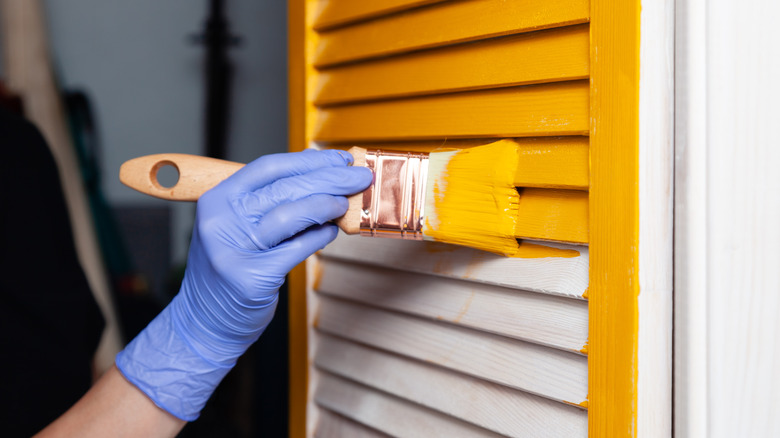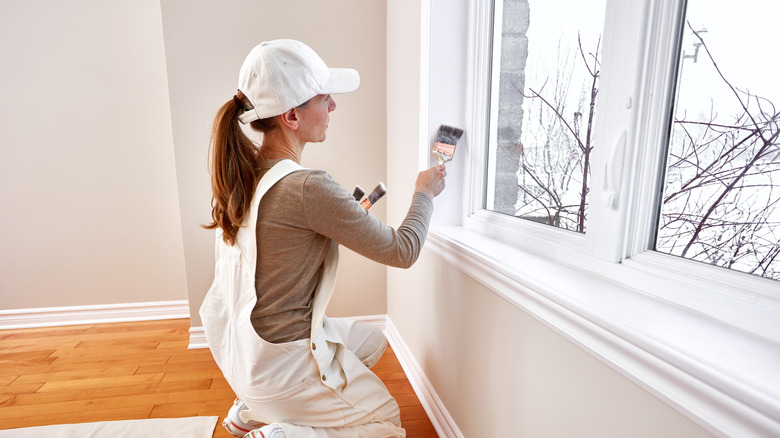Should All Of Your Interior Doors Be The Same Color? Our Interior Design Expert Weighs In
Though it's a detail that may not be at the forefront, interior door color can play a major role in your home's overall design. This begs the question: Should all your interior doors be the same color? Veronica Solomon, President & Lead Interior Designer of Casa Vilora Interiors, tells House Digest in an exclusive interview that she believes they should. "In terms of door style, I think for the most [part] they should match throughout a home, except for key spaces that you would want maybe a glass door, for example, a study or recreational room. In terms of the color of the doors, I think they do not have to match from room to room, however, I would keep the doors in one open area all the same color."
You won't regret an open floor plan or an upstairs hallway where all the doors match in style and color. "I think each room should have its own personality but still should feel cohesive with the rest of the house. Color plays a big role in giving each room its own personality and mood. Each room's color scheme for me determines the paint colors for doors." If you want to maintain personality and cohesion in rooms, consider a split-painted door. Paint the side of the door inside the room to match that color scheme, while the side facing the communal area matches the other doors. This creates a mix of cohesion and distinct personality.
Choosing an interior door color
Though you may have yet to put much thought into your interior doors' colors, you don't have to agonize over the colors you choose. Veronica Solomon suggests taking cues from other details of the design. "To keep things tasteful, the color chosen should be planned out to complement the overall color scheme in the room," Solomon says in an exclusive interview with House Digest. "For example, if you are using a patterned wallpaper with several colors, you may choose one of the more dominant colors to paint the doors." You could also do this with tile, flooring, or even furniture and art pieces in the room. Using this method will help with creating a cohesive color palette and make a uniquely colored door look like a conscious design choice.
A colored door is usually a less common choice than a neutral or wood-toned one. But it can work well as an accent to the space. "I am a huge color lover, so I am all for going with whatever color works," Solomon explains. "The doors shouldn't necessarily be the focal point of the room, but they should definitely support the overall scheme." Choosing a color that's already in the rest of the design or a complement rather than a contrasting color will help the door blend into the design a little more.
What else should you paint?
There is more than just the face of the door to think about when deciding to paint an interior door. "Of course the question will come up if the door jambs/trim should be painted in the door color or should you just paint the door," Veronica Solomon says in an exclusive interview with House Digest. "The answer is – it depends. Painting the door jambs could mean also painting all the baseboards and crown mouldings the same color, but again, that needs to be planned and be an intentional choice." Traditionally, window trim, crown molding, and baseboards are painted the same color as the door. This can also help the color be more evenly distributed around the room and prevent the door from looking like too much of a featured focal point. Plus, the right trim painting technique can make a big difference in making this project a breeze.
Painting the door and trim all the same color also tends to look more cohesive. However, painting just the door can be an interesting way to make a design statement. "Though my preference is to paint all trim the door color, sometimes just painting the door and not the jambs a bold color is enough," Solomon explains. You could, for example, paint the door but leave the jamb and trim a natural wood finish. This can add some natural warmth and a little bit of texture to the room while still getting a pop of color.


